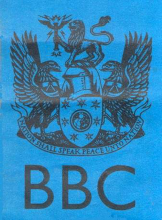Tuning In
Diasporic Contact Zones at the BBC World Service
Public Diplomacy

The BBC World Service has demonstrably wielded diplomatic influence since its inception, nearly eighty years ago. Indeed, this was the motivation behind the creation of new foreign language services just prior to the Second World War, in order to compete with German and Italian international broadcasting operations. While an active adjunct to the military campaign during WWII, especially in Europe, the continuing theme of what some now call “soft power” has persisted. Radio was particularly suited to the Cold War context were direct conflict was characterised by a mediated (and radiated) war of the broadcasters with the BBC, Radio Free Europe and the Voice of America on one side of the bi-polar divide and Moscow Radio, Radio Polskie and Budapest Radio, amongst them, on the other. More recently, the war on terror has forced another rethink about the means and methods of influencing global attitudes and allegiances.
Research Aims
- To examine the public diplomacy functions of the BBC World Service, both current and historic
- To survey the evolution of the contemporary machinery of public diplomacy within and between state and non-state actors and the significance of diasporic groups as a part of this communicative landscape
Research Questions
- How have modern media altered public diplomacy practices and what are the implications of this on the development of strategic communications?
- How can the success of public diplomacy be measured?
- Is the BBC World Service’s editorial independence compatible with its funding as an agent of public diplomacy?
Project contact:
Dr. Alban Webb, The Open University, a.j.webb@open.ac.uk
Dr Alban Webb is a Research Fellow in Sociology at the Open University, working as part of the ESRC Centre for Research on Socio-Cultural Change (CRESC). His previous research as a historian has focused on Cold War Britain, examining the UK’s nuclear deterrence strategy, intelligence services and civil defence planning. His book on the BBC World Service, London Calling: BBC External Services and the Cold War, will be published in 2011. His latest research, on the roles of public and cultural diplomacy in the context of international relations (most recently as part of the AHRC-funded Tuning In: Diasporic Contact Zones at the BBC World Service project) forms the basis of his ongoing examination of the changing Cultures of Diplomacy at work in British overseas communication strategies.
Project members:
- Cultures of Diplomacy


